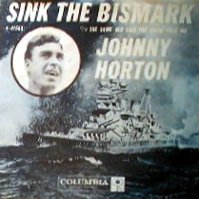| "Sink the Bismark (Sink the Bismarck)" | ||||
|---|---|---|---|---|
 The photo on the "45" Columbia record jacket is from the movie, but depicts the model of HMS Prince of Wales made for the movie. The models made for this movie are closely modeled after their real-life counterparts. | ||||
| Single by Johnny Horton | ||||
| B-side | "The Same Old Tale the Crow Told Me" | |||
| Released | 1960 | |||
| Genre | Country, Novelty | |||
| Length | 3:12 | |||
| Label | Columbia | |||
| Songwriters | Johnny Horton, Tillman Franks | |||
| Producer | Don Law [1] | |||
| Johnny Horton singles chronology | ||||
| ||||
"Sink the Bismark" (later "Sink the Bismarck") is a march song by American country music singer Johnny Horton and songwriter Tillman Franks, based on the pursuit and eventual sinking of the German battleship Bismarck in May 1941, during World War II. Horton released this song through Columbia Records in 1960, when it reached #3 on the charts. As originally released, the record label used the common misspelling "Bismark"; this error was corrected for later releases of the song. It was inspired by the 1960 British war movie Sink the Bismarck! and was, with the producer John Brabourne's approval, commissioned from Johnny Horton by 20th Century Fox who were worried about the subject's relative obscurity in the United States. Inexplicably, the size comparisons of guns and shells are switched. While the song was used in U.S. theater trailers for the film, it was not used in the actual film.